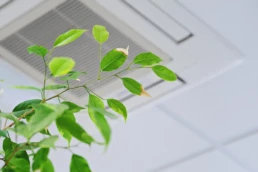Indoor Air Quality (IAQ) is a critical aspect of maintaining a healthy and comfortable living environment. Poor IAQ can lead to various health issues, including allergies, respiratory problems, and discomfort. HVAC (Heating, Ventilation, and Air Conditioning) systems play a crucial role in improving IAQ by effectively filtering and circulating the air in our homes. In this blog post, we will explore how HVAC systems can contribute to better IAQ and provide tips for optimizing indoor air quality through HVAC maintenance and upgrades.
Proper Ventilation:
One of the primary functions of an HVAC system is to provide ventilation, which helps remove stale air and introduce fresh outdoor air. Proper ventilation is crucial for diluting indoor pollutants and maintaining a healthy indoor environment. HVAC systems with mechanical ventilation options, such as energy recovery ventilators (ERVs) or heat recovery ventilators (HRVs), can efficiently exchange indoor and outdoor air while minimizing energy loss.
Air Filtration:
HVAC systems are equipped with air filters that capture dust, pollen, pet dander, and other airborne particles. Regularly replacing or cleaning these filters is essential for maintaining optimal IAQ. Upgrading to high-efficiency filters, such as HEPA (High-Efficiency Particulate Air) filters, can further improve air filtration by trapping smaller particles and allergens. Consult with an HVAC professional to determine the most suitable filter for your system.
Humidity Control:
Controlling humidity levels is crucial for maintaining good IAQ. Excessive humidity can promote mold and mildew growth, while low humidity can cause dryness and discomfort. HVAC systems with integrated humidifiers and dehumidifiers can help regulate indoor humidity levels. These devices work in conjunction with the HVAC system to add moisture or remove excess moisture from the air, creating a more comfortable and healthier indoor environment.
Regular Maintenance:
Proper HVAC maintenance is essential for ensuring optimal IAQ. Regularly scheduled maintenance, including cleaning coils, checking ductwork for leaks, and inspecting and cleaning the condensate drain, helps prevent the buildup of mold, bacteria, and other contaminants. Additionally, professional HVAC maintenance can identify and address any issues that may impact IAQ, such as leaks or malfunctioning components.
Duct Cleaning:
Over time, dust, debris, and allergens can accumulate in the ductwork of HVAC systems, reducing IAQ. Professional duct cleaning can help remove these contaminants, improving the overall air quality in your home. Consider scheduling duct cleaning every few years or as recommended by an HVAC professional.
Indoor Air Quality Monitoring:
Investing in an indoor air quality monitoring system can provide real-time data on the air quality in your home. These systems measure various parameters, such as particulate matter, volatile organic compounds (VOCs), and carbon dioxide levels. By monitoring IAQ, you can identify potential issues and take appropriate measures to improve air quality, such as adjusting ventilation or upgrading filtration systems.
For Indoor Air Quality Services in Plant City, FL Contact Mission Air Services
Maintaining good IAQ is crucial for our health and well-being. HVAC systems play a vital role in improving IAQ by providing ventilation, air filtration, and humidity control. By following proper HVAC maintenance practices, upgrading filters, and considering additional IAQ measures, such as humidity control and air quality monitoring, you can create a healthier and more comfortable indoor environment for you and your family. Consult with an HVAC professional to assess your specific IAQ needs and determine the best strategies for improving indoor air quality in your home.

